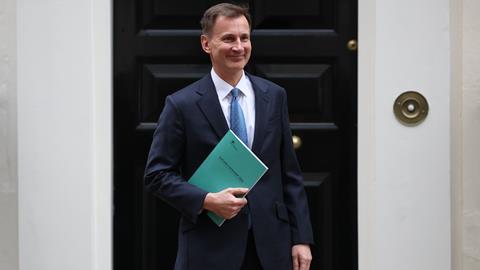Chancellor Jeremy Hunt has been accused of ignoring the legal sector as he outlined his vision for the nation’s economy. Hunt delivered his autumn statement today including a cut in national insurance contributions and an 8.5% increase in the state pension.
But measures specifically aimed at the legal sector were largely absent and the Treasury revealed later that justice spending will be unchanged at £10bn from 2023/24 to 2024/25. This is effectively a real terms cut, given that inflation is currently around 4.6% and the Office for Budget Responsibility predicts that it will not come down to 2% until the second quarter of 2025.
Hunt announced that the government would make full expensing permanent – allowing businesses to offset investment in infrastructure against tax – but this applies only to corporation tax, so law firm LLPs cannot benefit from the scheme.
Nick Emmerson, Law Society president, said: ‘While it is great news for business that full expensing has been made permanent, it is disappointing that parts of the legal services sector have once again been overlooked. Our call for the scheme to be expanded to include all law firms has gone unheard.’
Hamilton Forrest, tax expert and partner at City firm Fladgate, said: ‘Business will be pleased with the continuation of full expensing for capital expenditure, but this will only benefit companies that are tax-paying. So, it does nothing for start-ups or new businesses with a long lead to profitability.’
Emmerson said the government had missed the chance to invest in a legal services sector that needs support to continue to be an economic powerhouse.
‘No new money was announced for a justice system crying out for investment despite it being in crisis with huge court backlogs, crumbling court buildings and a chronic shortage of lawyers and judges,’ he added. ‘Investment is needed right now to ensure access to justice remains open to everyone.’
Elsewhere, the Society of Trust and Estate Practitioners said it was disappointed Hunt had not tackled the issue of inheritance tax, despite speculation over the weekend that he may reduce the rate or bring in other reforms.
Emily Deane TEP, head of government relations at STEP, said: ‘Reform could be as simple as reducing the current 40% fixed rate, removing some of the reliefs, and abolishing potentially exempt transfers. A lower fixed rate alone would simplify the whole system thereby decreasing opportunities for avoidance and abuse.’
The government also announced that unemployed people who have been jobless for 18 months and then reject work placements will not only lose their benefits but also their entitlement to legal aid. The scope of this removal was not made clear, although it would be likely to apply to civil legal aid rather than criminal.
The Law Society has warned that vulnerable members of the public such as those facing homelessness and those with disabilities will be disproportionately affected. It pointed out last week that the measure was counterproductive because of the knock-on cost to the taxpayer of misconceived court applications and cases being delayed.
This article is now closed for comment.




























11 Readers' comments